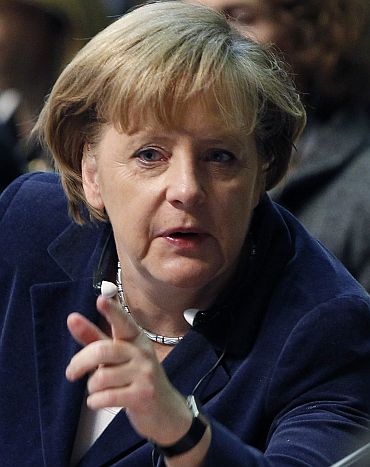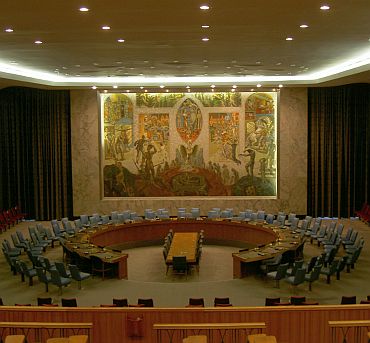This article was first published 14 years ago
Home »
News » What Angela Merkel's India trip is all about
What Angela Merkel's India trip is all about
Last updated on: May 30, 2011 14:15 IST
Image: German Chancellor Angela Merkel
German Chancellor Angela Merkel will have a packed programme when she arrives in New Delhi on a one-day visit on May 31 accompanied by a high-powered delegation.
The German Chancellor will initiate the first inter-governmental dialogue with Prime Minister Manmohan Singh, inaugurate the celebrations to mark the 60th anniversary of establishment of diplomatic relations between the two countries and will be conferred the Jawahar Lal Nehru Award for International Understanding by President Pratibha Patil at Rashtrapati Bhawan.
There will be two important issues that are likely to feature during the discussions -- the selection of a new managing director for the International Monetary Fund and the deal for a new fighter aircraft for the Indian Air Force.
French Finance Minister Christine Lagarde is the leading candidate for the IMF post and while Germany is keen on a European candidate, India opposes the principle of nationality for choosing the IMF chief.
The Indian position is in line with its views on reforming the international financial institutions and it has been working for a consensus among the developing countries on the subject of the new IMF chief.
...
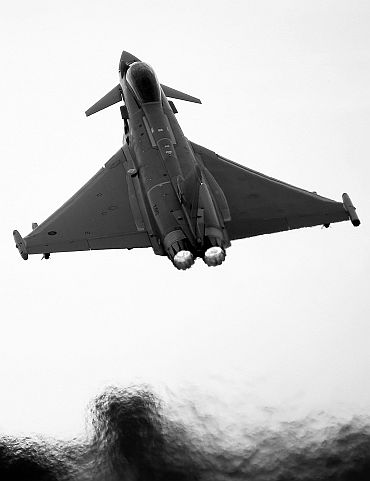
Image: EADS's Eurofighter Typhoon
Hovering in the background of the high profile visit is the big ticket item that could transform the bilateral relations -- the $10 billion deal for the Medium Multi-role Combat Aircraft that the Indian Air Force plans to buy.
Competition over the deal intensified last month after the IAF's trials shortlisted the Germany-led four nation consortium, EADS's Eurofighter Typhoon and the French-owned Dassault Aviation's Rafale aircraft.
French Defence Minister Gerard Longuet on a visit to India last week had stressed the advantages of the Rafale aircraft and having only one partner to deal with as against four partners.
"We have one single speaking partner (Dassault) instead of four partners (the consortium of four European firms from Germany, Italy, Spain and UK)," the French minister had said.
German Ambassador Thomas Matusik was quick to point out that the Eurofighter was a new aircraft and not an old aircraft that had been upgraded several times while speaking to the media in New Delhi ahead of the visit of the German Chancellor.
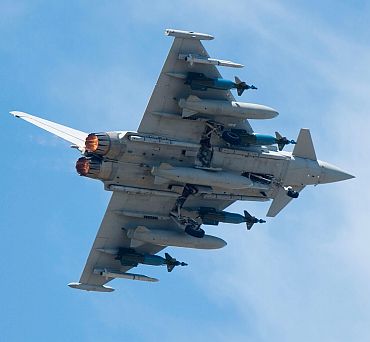
Ambassador Matusik went on to add that end-user certificate was a part of security related deals but the European company would not insist on on-site inspections and monitoring for the end-user certificate.
EADS has a better offer for transfer of technology; it already has a defence engineering centre in Bangalore and is in a better position to guarantee a 60 per cent technology transfer with the deal.
It is likely that the German side would want to reiterate the advantages of the Eurofighter during their discussions in New Delhi.
India and Germany have warm and friendly political ties. The two countries have had a strategic partnership since 2000, India is the only country outside Europe barring Israel, with whom Germany has a strategic partnership.
Image: File photo of Merkel with Prime Minister Manmohan Singh
In 2006, the two countries gave the partnership a sharper focus in the fields of energy, science and technology and defence during Prime Minister Manmohan Singh's visit to Germany.
The two countries are now raising the bilateral dialogue to a new level with inter-governmental consultations -- a structured dialogue that Germany has with a few European countries, the United States and Israel.
The inter-governmental consultations will cover a wide range of bilateral relations, from trade, sustainable energy, environment technologies, security and defence policy to education and research, vocational training, and infrastructure.
On the political side, the discussions will focus on current, regional and global issues, the fight against terrorism, global financial reforms, as well as the G-20 discussion.
Image: United Nations Security Council
An important issue will be the joint strategy on reform of the United Nations Security Council as both countries currently hold non-permanent, rotating seats in the UNSC and are also contenders for a permanent seat in an expanded Security Council.
India-Germany trade has been increasing in the past few years.
Germany, as the largest economy in Europe, is India's largest trading partner in Europe; bilateral trade has been growing at more than 15 per cent annually.
In 2010, bilateral trade had increased by 15 per cent to reach the figure of Euro 15.5 billion and is expected to cross the target of Euro 20 billion by 2012.
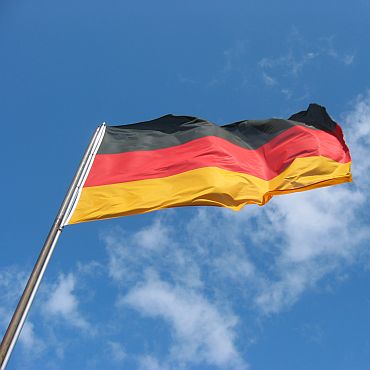
German investments have shown a sharp increase in the past three years, taking Germany to the position of third largest investor in India.
German investments have been directed to sectors such as services, chemicals, automobiles, and electrical equipment. Indian investment in Germany has also increased, especially in the IT sector.
There are, however some points of discussion on the trade side, Germany is seeking more economic reforms in India. During his last visit to Germany, Dr Singh had urged Germany to relax it export laws in the field of high technology.
Chancellor Merkel had, on her part, suggested that a free trade agreement between India and the European Union would lead to greatly increased volumes of trade between the two sides.
